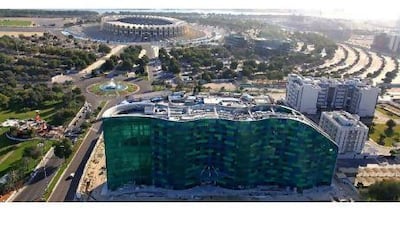ABU DHABI // When Rocco Forte Hotels decided to make its entrance to the Middle East, it chose to do so through the dunes of the UAE.
Atkins Middle East, the architect of the wave-shaped Rocco Forte property on Airport Road, decided the luxury chain's first hotel in the region should have a markedly Arabian look.
"We wanted to take into consideration the values and culture of the UAE and its inspiration to become a destination of distinction," says Iraklis Andreakis, the senior project manager at Atkins.
"So we looked at the landscape of Abu Dhabi and what came to mind was the desert sand dunes, which represented both the landscape and traditions of the Gulf peninsula.
"As such, a dynamic geometry for the outer shape of the building into a wavy and curved facade was further developed."
The exterior of the hotel, covered in a mosaic of blue and green glass and aluminium, was also inspired by the waters of the Arabian Gulf and the marine life in the region, Mr Andreakis says.
The architects were presented with a simple but challenging brief by the hotel's management: develop a design that reflects the hotel's core values of luxury, best design, best service and best location.
But the unique design presented a series of challenges for the team of 30 architects.
"[We had] to develop the design and engineering into something that was real, workable and tangible - basically, to build the hotel without compromising our goals," Mr Andreakis says.
"One of the major challenges was the hotel's geometry, which gave us all many sleepless nights."
Working closely with the contractors, the architects were able to devise ways to meet this challenge head on.
Instead of building the hotel one level at a time in a continuous process, each of the 10 floors had to be built and concreted in three separate phases to achieve the wave effect.
Other features, including a 46-metre high atrium with free-standing glass that gives an unobstructed view of the Abu Dhabi skyline and the Sheikh Zayed Grand Mosque, required even more inventive thinking. Keeping in mind the high temperatures and sunlight that would flood the atrium through the clear glass, the architects chose to instal fritted panels that would reflect the natural light.
A floating sky bar and restaurant on the sixth floor of the 10-storey atrium was another poser to be tackled.
"This presented us with a unique challenge as we had to build something safe out in mid-air, and we achieved it," Mr Andreakis says.
"The restaurant is suspended on a massive steel cantilever, providing guests with unparalleled views of Abu Dhabi."
The curvy, natural theme of the hotel's external design is continued inside.
Olga Polizzi, the director of design for Rocco Forte Hotels, says the interior presented big, yet interesting, challenges.
"We used wave inserts in the flooring, rounded furniture and earth colours," Ms Polizzi says.
Artwork from the local artists Salwa Zeidan and Ali Ahmad Said Esber - Ms Polizzi's favourite regional poet and artist - adorn the walls to add to local appeal.
A large triptych by the Emirati artist Fatema Al Mazroui can be seen the moment a guest enters the reception area.
Each of the 281 rooms are of generous size, with leather accents and seating, and the Arabic expression "May it rain on our desert" etched above each large bathtub.
"Every property needs to reflect its location," Ms Polizzi says. "And to do this we used colours, shapes and art that are reflective of the Middle East."
The design and construction of the Dh600 million project began in February 2007 and the hotel is due to open in the last quarter of this year.
The Tourism Development and Investment Company was the project's master developer, and Al Farida Investments its private developer.

